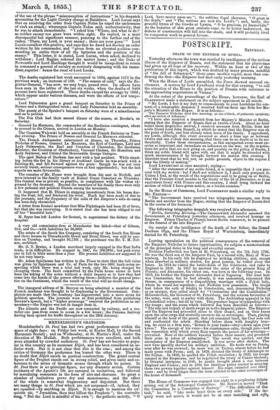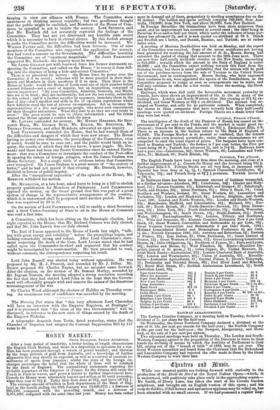The House of Commons was engaged last night in a
perplexing debate arising out of the Sebastopol Committee. Mr. ROEBUCK moved"phat: the Co Itee be a Committee of Secrecy?' "The difficulties o
task," he said " like rocks beset them on every side." if the in- quiry were not secret, it would not be at once searching sad safe, keel:ling in view our alliance with Prance. The Committee *ere unanimous in thinking secrecy requisite ; but two gentlemen thought that the public might be excluded, and Members of the Rouse of Com- mons be appealed to not to violate the secrecy. Lord SEYMOUR said that Mr. Roebuck did not accurately represent the feelings of the Committee. They had not yet discovered any horrible state secret which it is necessary to bury in eternal silence. By this foolish attempt to make the Committee secret, the difficulties Would be increased. Mr. Wirsort Perraw said, the difficulties had been foreseen. Out of nine members of the Committee who supported the application for secrecy, five had voted a censure on the Government. The difficulties besetting the Committee are of "enormous magnitude." Sir Joint Pamlico:mos supported Mr. Roebuck—the inquiry must be secret. Sir JAMES GRAHAM put with renewed force his former statements re- apecting the Committee, and called on the House " to rescue it from fall- ing into the disgrace of being a bole. and-corner Committee."
There is no precedent for secrecy : the House loses its power over the Committee if it be secret ; witnesses will be more guarded in their state- ments and Members in their questions if it be open. Then there is the House of Lords : would the House of Lords send one of their number before a secret tribunal—not a court of inquiry, but an inquisition, composed of eleven inquisitors ? "By your Committee, Admirals, Generals, and Minis- ters are to be tried; they are incidentally, but not the less really, submitted to this ordeal ; and if a further sacrifice necessary, immolate them in the face of day—don't smother and stifle in No. 17 up-stairs reputations which have hitherto stood the test of adverse circumstances. Act as becomes the representatives of a free and generous people, who never seek concealment for their thoughts and actions. What they dare to do they are ever ready to avow." The press would be sure to obtain information ; and Sir James warned the House against a conflict with the press.
Mr. LAYARD contended for secrecy. Mr. HENRY HERBERT, Sir BEN- JAMIN HALL, Mr. GEORGE BUTT, Mr. ELLICE, Mr. BENTINCK, Mr. THOMAS DI:INCOMES, and other Members, advocated an open inquiry. Lord PALMERSTON reminded the House, that he had warned them of the difficulties and dangers of which they were now aware. The House having no power over witnesses, the proceedings of the Committee, even if secret, would be sure to ooze out; and the public would think an in- quiry, the results of which they did not know, a mere juggle. Mr. Me- ssina said there had been one Secret Committee since he entered Parlia- ment: that was a Committee to investigate the conduct of the Post-office in opening the letters of foreign refugees, when Sir James Graham was Home Secretary. Not a single tittle of evidence before that Committee ever transpired. Sir James Graham is a great master of "the oratory of terror," and he had not spared it that evening. Mr. Disraeli, however, declared in favour of public inquiry. After the "unequivocal expression" of the opinion of the H01150, Mr. Bemires withdrew his motion.
Mr. llfunnoucar, at a late hour, asked leave to bring in a bill to abolish property qualification for Members of Parliament. Lord PALMERSTON opposed the motion, on the broad ground that this was part of a great system of change in the representative arrangements of the country, which it is understood shall be postponed until another period. The mo- tion was negatived by 28 to 27.
On the motion of Lord PALMERSTON, a bill to enable a third Secretary and a third Under-Secretary of State to sit in the House of Commons was read a first time.
A Committee, which has been sitting on the Barnstaple election, last night reported to the House, that Mr. Richard Guineas was duly elected, and that Mr. John Lawrie was not duly elected.
The Earl of Lucan appeared in the House of Lords last night, "talk- ing with great energy and volubility" before the proceedings began, and looking remarkably strong and robust. After Lord Clarendon's state- ment respecting the death of the Czar, Lord LIICAN stated that he had called upon the Commander-in-chief and requested that his conduct might be investigated by a court-martial. He then proceeded to read, without comment, the correspondence respecting his recall.



























 Previous page
Previous page